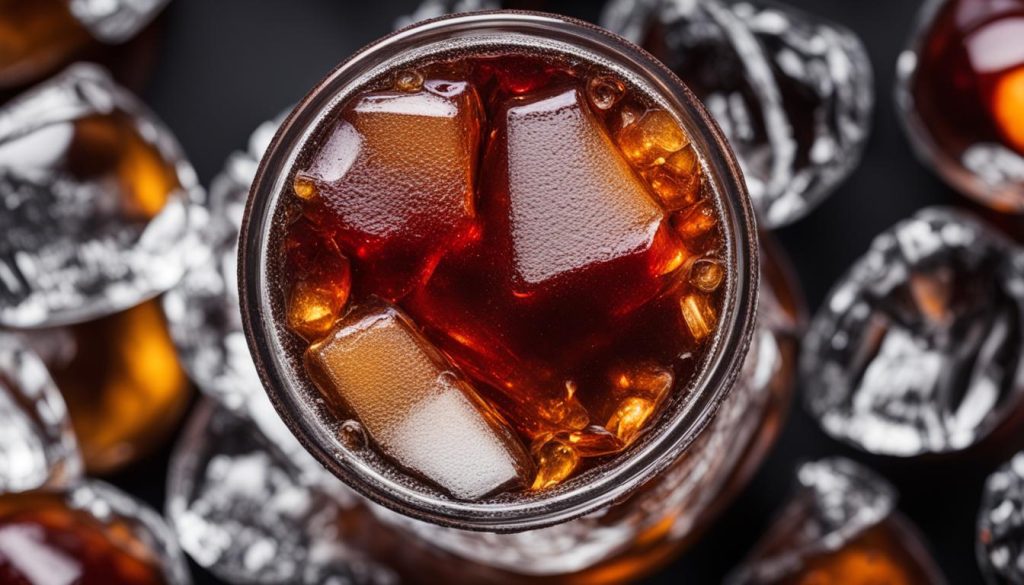As a health-conscious individual, I always strive to make informed choices when it comes to my diet and overall well-being. Recently, I delved into the topic of diet soda, questioning its impact on my health. What I discovered was quite concerning.
Research has revealed that diet soda, despite its seemingly harmless label, can pose significant risks to our health. Artificially sweetened beverages, including diet soda, have been found to be just as detrimental to our hearts as sugary drinks. In fact, consuming more than two servings of sugary sodas or diet drinks per day has been linked to an increased risk of premature death and cardiovascular disease.
While many of us turn to diet soda as a healthier alternative to regular soda, evidence suggests that there are hidden harms associated with these artificially sweetened beverages, particularly for women. This calls for further research and regulation of both sugary and diet drinks to protect our health and well-being.
Why Is Diet Soda Bad For You
- Excessive consumption of diet soda has been linked to an increased risk of premature death and cardiovascular disease.
- Artificially sweetened beverages, such as diet soda, may have hidden risks that need further research and regulation.
- Both sugary and diet drinks should be consumed in moderation to protect our health and well-being.
- Women may be particularly vulnerable to the potential harms of artificially sweetened beverages.
- It’s crucial to make informed choices about our beverage consumption and consider healthier alternatives.
The Impact on Liver Health
Excessive consumption of diet soda can have detrimental effects on liver health and overall well-being. Studies have revealed various health problems associated with the consumption of diet soda, including weight gain, metabolic syndrome, and liver damage.
The artificial sweeteners used in diet sodas, such as aspartame and sucralose, have been found to disrupt glucose metabolism and insulin sensitivity. This disruption can potentially lead to the development of conditions like non-alcoholic fatty liver disease (NAFLD), a condition characterized by the accumulation of fat in the liver.
Research suggests a potential link between artificial sweeteners and alterations in liver enzymes and gut microbiota. These metabolic changes raise concerns about the long-term effects of diet soda on liver health and overall well-being.
It is important to understand that the negative impacts of diet soda on liver health are not limited to the liver alone. The liver plays a crucial role in various metabolic processes, including detoxification, hormone regulation, and nutrient storage. Disrupting its normal functioning can have widespread effects on the body.
Therefore, it is advisable to consume diet soda in moderation and explore healthier beverage options that promote liver health and overall well-being. Making conscious choices and opting for beverages that are low in sugar and artificial additives can help reduce the risks associated with diet soda consumption.
The Connection Between Diet Soda and Metabolic Syndrome
In addition to its impact on liver health, the consumption of diet soda has been associated with an increased risk of metabolic syndrome. Metabolic syndrome is a cluster of conditions, including high blood pressure, elevated blood sugar levels, excess abdominal fat, and abnormal cholesterol levels.
Several studies have found a significant association between high diet soda consumption and an increased risk of metabolic syndrome. The artificial sweeteners used in diet sodas may disrupt the body’s metabolic processes and lead to insulin resistance, a key factor in the development of metabolic syndrome.
While more research is needed to fully understand the relationship between diet soda and metabolic syndrome, the evidence suggests that reducing or eliminating diet soda consumption can have positive effects on metabolic health.
Choosing Healthier Alternatives
Given the potential risks associated with diet soda, it is essential to consider healthier alternatives. Water remains the best choice for hydration, as it is natural, calorie-free, and essential for overall health.
If you are looking for flavored options, herbal teas, infused water, and sparkling water with natural fruit flavors can be refreshing and satisfying alternatives to diet soda. Unsweetened tea and coffee are also viable options for those seeking a caffeinated beverage.
By opting for these healthier alternatives, you can reduce your reliance on diet soda, minimize the potential negative impacts on your liver health, and improve your overall well-being.
The Delicate Balance of Liver Function
The liver plays a vital role in maintaining metabolic homeostasis. It is responsible for various essential functions in the body, including detoxification, hormone production, and nutrient metabolism. However, excessive consumption of diet soda can disrupt this delicate balance and have detrimental effects on liver health.
Research has shown that diet soda, despite being promoted as a healthier alternative to regular soda, poses its own set of health risks. One of the key culprits is the presence of artificial sweeteners, such as aspartame and sucralose, which are commonly used to replace sugar in diet sodas. These artificial sweeteners can affect insulin sensitivity and glucose metabolism, potentially compromising the liver’s ability to function properly.
Insulin is a hormone that helps regulate blood sugar levels and plays a crucial role in maintaining metabolic balance. When insulin sensitivity is impaired, as is the case with excessive diet soda consumption, the liver can struggle to process glucose effectively. This disruption in glucose metabolism can contribute to the development of insulin resistance and increase the risk of metabolic disorders, such as metabolic syndrome.
Metabolic syndrome is a cluster of conditions that includes high blood pressure, elevated blood sugar levels, abnormal cholesterol levels, and excess abdominal fat. These risk factors significantly increase the chances of developing cardiovascular diseases, such as heart disease and stroke.
Furthermore, studies have also suggested a potential link between diet soda consumption and mental health issues. Higher intake of artificially sweetened beverages has been associated with an increased risk of depression and anxiety disorders. Although the exact mechanisms behind this association are still being investigated, it is believed that the disruption in the gut-brain axis caused by artificial sweeteners may play a role.

Given these concerns, it is essential to evaluate the potential risks associated with the regular consumption of diet soda. While there is ongoing research on this topic, the current evidence suggests that diet soda may have detrimental effects on liver function and overall health. To protect your liver and minimize the associated risks, it’s important to consider healthier beverage alternatives and make conscious choices about what you consume.
Choosing water as your primary source of hydration is always an excellent choice. If you’re looking for flavor and carbonation, consider sparkling water infused with slices of fruits like lemon, lime, or berries. Additionally, unsweetened tea or coffee can provide a satisfying alternative to diet sodas. These choices will not only reduce your reliance on diet soda but also support overall liver health and well-being.
Remember, maintaining a healthy liver is essential for overall health. By prioritizing a balanced diet, regular exercise, and seeking professional guidance, you can take proactive steps to protect your liver function and long-term well-being.
The Hidden Dangers of Artificial Sweeteners
Artificial sweeteners, commonly used in diet sodas, can have a negative impact on liver health. These synthetic substitutes have been shown to affect glucose metabolism and liver enzymes, potentially leading to metabolic dysfunction and liver-related complications.
The consumption of artificial sweeteners has raised concerns about their potential health risks. While the long-term consequences of excessive artificial sweetener intake are still being researched, it’s important to be aware of the potential harm they can cause.
The Impact on Liver Health
Research suggests a potential link between artificial sweeteners and alterations in glucose metabolism, liver enzymes, and even the gut microbiota. These disruptions to liver function may contribute to metabolic dysfunction and increase the risk of liver-related complications.
With the growing concern about the negative effects of artificial sweeteners, it’s crucial to evaluate the potential risks associated with their consumption. While more studies are needed to fully understand their long-term consequences, it’s wise to moderate the intake of these sweeteners and explore healthier alternatives.
Health Risks and Metabolic Dysfunction
- Artificial sweeteners have been associated with an increased risk of metabolic syndrome, a cluster of conditions that includes high blood sugar, high blood pressure, and excess body fat.
- They have also been linked to insulin resistance and impaired glucose metabolism, which can further contribute to metabolic dysfunction.
- In addition, artificial sweeteners may disrupt the balance of gut bacteria, which plays a crucial role in regulating metabolism and overall health.
While these findings are concerning, it’s important to note that individual responses to artificial sweeteners may vary. Some people may tolerate them well, while others may experience adverse effects. As with any dietary decision, it’s recommended to listen to your body and consult a healthcare professional for personalized advice.
A Shift Towards Healthier Alternatives
To mitigate the health risks associated with diet soda, it’s important to consider healthier alternatives. Water remains the best choice for hydration, but for those craving flavor and carbonation, sparkling water infused with fruits can be a refreshing option.
Unsweetened tea and coffee are also recommended alternatives to sugary or artificially sweetened drinks. By making conscious choices and opting for beverages that are lower in sugar and artificial additives, individuals can reduce their reliance on diet soda and improve their overall health.
If you’re looking for a soda alternative that provides a similar fizzy sensation, try sparkling water. You can enhance its flavor by adding fresh fruits, such as lemon, lime, or berries. Whether you prefer a citrusy twist or a burst of berry goodness, adding natural flavors to sparkling water can satisfy your taste buds without the added sugars and artificial sweeteners found in diet sodas.
Unsweetened tea is another excellent choice for those seeking healthy beverage options. Green tea, for example, offers antioxidants and potential health benefits. With a wide range of flavors available, you can enjoy a warm or refreshing cup of tea while avoiding the negative effects of diet soda.
Coffee lovers rejoice! Unsweetened coffee can also be a healthier alternative to diet soda. It can provide a natural energy boost without the artificial additives. Kickstart your day with a cup of black coffee or explore different coffee-based drinks, such as Americanos or espressos, for a delightful caffeine fix.
Making the switch from diet soda to healthier alternatives may take some time, but it’s a step in the right direction for improved well-being. By opting for beverages that are lower in sugar and artificial additives, you can support your overall health and reduce the negative impacts of diet soda on your body.

Seeking Professional Guidance for Liver Health
If you have concerns about the impact of your diet soda consumption on your liver health, it is essential to seek guidance from a healthcare professional. Consulting a healthcare professional can provide you with personalized advice and insights into the potential risks you may face.
An online doctor consultation platform offers a convenient and accessible way to connect with medical experts who specialize in liver health. Through an online consultation, you can discuss your dietary choices, lifestyle factors, and any symptoms you may be experiencing. This conversation will help you gain a better understanding of the potential risks associated with diet soda consumption and enable you to take a proactive approach to your liver health.
During the consultation, the healthcare professional can address any specific concerns you may have and provide guidance on how to improve your liver health. They may recommend lifestyle modifications, dietary changes, and further diagnostic tests, if necessary.
Remember, your liver is a vital organ, and its health should not be taken lightly. Seeking professional guidance can help you make informed decisions about your liver health and take the necessary steps to protect and improve its function.
Conclusion
After delving into the risks associated with drinking diet soda, it’s clear that this popular beverage poses significant health concerns. Excessive consumption of diet soda has been linked to liver damage, weight gain, and metabolic dysfunction. To safeguard our well-being, we must explore healthier alternatives and make informed choices about what we drink.
By opting for alternatives like water, unsweetened tea or coffee, and other low-sugar options, we can reduce our reliance on diet soda and improve our overall health. Choosing these beverages not only helps to avoid the negative impacts of diet soda but also provides essential hydration without any hidden risks.
If you are concerned about the health risks of diet soda or its potential impact on your liver, it’s advisable to seek professional guidance. Consulting with healthcare professionals, especially through online doctor consultation platforms, allows you to receive personalized recommendations and insights regarding the risks you may face. Remember, it’s crucial to make proactive decisions about your liver health and overall well-being.
FAQ
Why is diet soda bad for you?
Diet soda can be detrimental to your health due to the potential risks associated with its consumption. Artificial sweeteners used in diet soda may disrupt glucose metabolism and insulin sensitivity, leading to conditions like weight gain, metabolic syndrome, and liver damage.
What are the health risks of diet soda?
The health risks of diet soda include weight gain, metabolic syndrome, liver damage, and an increased risk of cardiovascular disease. Excessive consumption of artificial sweeteners present in diet sodas can disrupt the delicate balance of the liver and lead to various health problems.
What are the side effects of diet soda?
The side effects of diet soda can include weight gain, metabolic dysfunction, and liver damage. Artificial sweeteners used in diet sodas may have negative impacts on glucose metabolism and insulin sensitivity, potentially leading to these health concerns.
What makes diet soda unhealthy?
Diet soda is considered unhealthy due to its use of artificial sweeteners, which can disrupt glucose metabolism and insulin sensitivity. This disruption can contribute to weight gain, metabolic syndrome, and liver-related complications.
What are the dangers of diet soda?
The dangers of diet soda include an increased risk of weight gain, metabolic syndrome, liver damage, and cardiovascular disease. These risks are associated with the artificial sweeteners used in diet sodas and their potential effects on glucose metabolism and liver health.
What are the harmful effects of diet soda?
The harmful effects of diet soda can include weight gain, metabolic dysfunction, and liver damage. Artificial sweeteners used in these beverages may disrupt glucose metabolism and insulin sensitivity, leading to these health concerns.
Why should you avoid diet soda?
It is advisable to avoid diet soda due to its potential health risks. Excessive consumption of artificial sweeteners used in diet sodas can lead to weight gain, metabolic syndrome, and liver damage. Opting for healthier alternatives can be a better choice for overall well-being.
What are the health problems caused by diet soda?
Health problems caused by diet soda may include weight gain, metabolic dysfunction, and liver damage. Artificial sweeteners used in these beverages may disrupt glucose metabolism and insulin sensitivity, contributing to these issues.
What are the risks of drinking diet soda?
The risks of drinking diet soda include an increased risk of weight gain, metabolic syndrome, liver damage, and cardiovascular disease. These risks are associated with the artificial sweeteners used in diet sodas and their potential effects on glucose metabolism and overall health.
What are the negative impacts of diet soda?
The negative impacts of diet soda can include weight gain, metabolic dysfunction, and liver damage. Artificial sweeteners present in these beverages may disrupt glucose metabolism and insulin sensitivity, leading to these health concerns.
What are the potential harms of diet soda?
The potential harms of diet soda include weight gain, metabolic syndrome, and liver damage. Artificial sweeteners used in these beverages may disrupt glucose metabolism and insulin sensitivity, potentially leading to these health risks.




